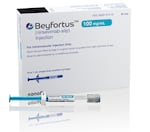
A nursing student draws up doses at a vaccine clinic held at Clackamas Town Center in this Nov. 10, 2021, file photo.
Kristyna Wentz-Graff / OPB
Two new therapies available this month could dramatically reduce the risk of lung infections for infants. Both target respiratory syncytial virus, or RSV. But experts say the rollout of both therapies will be challenging this year.
The drug nirsevimab, brand named Beyfortus, is a monoclonal antibody, similar to a vaccine, approved for all infants up to 8 months old.
Pediatricians in Oregon expect to start receiving the first shipments of Beyfortus this week.
The CDC also recently announced it has approved the use of the Pfizer RSV vaccine for adults 60 and older in pregnant people too, as a way of conferring immunity to newborns after birth.
While not serious for older children and healthy adults, RSV can develop into bronchiolitis or pneumonia in younger children and is the most common cause of hospitalization for infants in the United States.
The maternal shot is only recommended for pregnant people during a relatively short window in pregnancy, weeks 32 through 36, due to a potential but unproven concern it may increase preterm births. Providers say that could limit uptake of the vaccine.
The American Academy of Pediatrics recommends that every baby whose mother did not get the maternal shot receive Beyfortus in the first week of life.
But in Oregon, children’s health experts are concerned that some babies are going to face obstacles to getting the monoclonal antibody.
The high cost of Beyfortus, $495 a dose, and the rigid rules that govern the federal effort to distribute free shots to kids on Medicaid have combined to make the rollout a scattershot effort.
A medical breakthrough
In August, the CDC approved Beyfortus for all babies up to 8 months old during their first RSV season. It’s also recommended for older babies at higher risk, such as those with chronic lung disease and cystic fibrosis, and American Indian or Alaska Native babies.
In clinical trials, Beyfortus reduced RSV hospitalizations and health care visits in infants by almost 80%.
“This is groundbreaking, honestly,” said Katie Sharff, chief of infectious disease for Kaiser Permanente Northwest.

This illustration provided by AstraZeneca shows packaging for their medication, Beyfortus. In July 2023, the FDA approved Beyfortus, an antibody treatment created to protect babies against respiratory syncytial virus (RSV).
Courtesy of AstraZeneca
Beyfortus is a monoclonal antibody treatment, not a traditional vaccine like the Pfizer shot. The protection it provides is passive immunity, similar to the protection babies get from nursing. It lasts about five months, long enough to get babies past their first RSV season when they’re at highest risk.
“Their airways develop and their lungs develop,” Sharff said. “So getting RSV later, as a child instead of as an infant, probably less likely to have severe complications of difficulty breathing, needing to be on a ventilator.”
Sharff is particularly motivated to help families avoid severe RSV because she’s experienced it. Her daughter had an RSV infection as an infant, needed care in the emergency department, and went on to develop asthma, a condition that’s more common in children that had severe RSV infections.
For health systems that have been worn down by the so-called tripledemic of respiratory viruses — COVID, flu and RSV — keeping infants out of the hospital could be an immediate game-changer.
Last year was a historically bad season for RSV. Measures that states took to slow the spread of COVID-19, like masking, wiped out RSV for a while too.
As more babies and toddlers were all exposed to it for the first time at the same time, the virus came roaring back.
In Oregon, the surge of pediatric hospitalizations prompted Gov. Kate Brown to declare a public health emergency and forced local hospitals to add capacity to their pediatric ICUs. Some hospitals even had to send patients out of state.
“The promise of nirsevimab is that should never, never happen again,” said Ben Hoffman, professor of pediatrics at Oregon Health & Science University’s Doernbecher Children’s Hospital and president-elect of the American Academy of Pediatrics.
A quick rollout
Despite the promise of both Beyfortus and the Pfizer RSV shot, there are obstacles to getting it to enough infants to make a dent in RSV hospitalizations this year.
Timing and supply, for starters.
RSV cases are already rising in the southeastern states, a sign the season may be underway. Sharff is expecting the first shipment of Beyfortus for Kaiser patients to arrive in early October. But she still doesn’t know how many doses will be in it.
“I don’t know if we will have enough product for everyone who wants it,” Sharff said.
Sharff is hopeful that any shortages will be brief, and that by early next year, she will have enough of the drug to offer to every qualifying baby in their first and second RSV season. Initially, Kaiser Permanente will be reserving its doses for the highest-risk population: newborns in the first week of life.
In theory, Pfizer’s maternal RSV vaccine should be available in clinics more quickly because it’s the same formulation as the shot approved for adults 60 and up.
Dorenbecher’s Hoffman is especially concerned that not all babies will have an equal opportunity to get Beyfortus.
The fairest way to distribute the shot is to offer it shortly after birth, before babies leave the hospital. This is the approach Kaiser is taking.
But Hoffman said many hospitals across the country can’t afford that, including Doernbecher.
“The obstacle is money,” he said. “This product is phenomenally expensive.”
The vaccine is supposed to be free for all patients. But for providers and insurers picking up the cost, Beyfortus is the most expensive childhood vaccine the CDC recommends. At $495 per dose, Beyfortus costs about four times more than the new COVID shot.
Sanofi, the company that makes Beyfortus, said it is offering health care providers an order now, pay later option to help reach more infants this year.
Pfizer and Sanofi both said their drugs are cost-effective over the long term, because it’s cheaper to keep babies out of the hospital.
Vaccines for children
The crux of the cost problem for hospitals is what to do about babies who qualify for free vaccines through a 30-year-old federal program, called Vaccines for Children, VFC.
The program is the government’s way of getting free vaccines to children on Medicaid, uninsured children, and Alaska Native and American Indian children. In Oregon, those groups together are about half of all births.
Health care providers can’t bill Medicaid for Beyfortus. Instead, they’re supposed to sign up for the VFC program. Through it, the federal government gets shots from drugmakers like Sanofi at a discount, and then arranges for them to be shipped for free to VFC-enrolled providers.
But most hospitals aren’t enrolled in the VFC program.
In Oregon, more than 40 hospitals deliver babies. Just one, Salem Hospital, is part of the VFC program and eligible to order free doses of Beyfortus for its Medicaid population. Nationwide, only about 10% of birthing hospitals are enrolled in VFC.
Until Beyfortus, most hospitals didn’t have a strong incentive to participate. The rest of the childhood vaccine series is typically given to kids by pediatricians, in outpatient clinics, not in the hospital.
The VFC program includes stringent anti-fraud measures that make it hard for new providers to sign up, according to immunization experts. Doses have to be stored separately. The person giving the shot has to know what insurance the child has, and account for each dose in a state-run electronic record system.
Mimi Luther, the immunization program manager for the state of Oregon, said the rules are nearly impossible for hospitals to follow.
“I look forward to the day when the feds have the opportunity to modernize that system to make it easier for providers to enroll and stay enrolled,” she said.
The result is that most health systems that choose to give Beyfortus to all their patients at birth, like Kaiser Permanente Northwest, will lose money doing it. For hospitals that serve a higher percentage of patients on Medicaid, the cost could be enormous.
Instead, many health systems will give it to babies at their first pediatric visit, which is supposed to take place within the first week of life.
Hundreds of outpatient pediatrics clinics in Oregon are VFC enrolled, and are ordering the shot.
That will work for a majority of families, Luther said, but not every family has access to primary care or understands how to get an appointment. “It leaves out the people who live life on the edge,” she said.
Luther said Oregon has asked the CDC to relax some of the VFC rules so more birthing hospitals can participate, so far without success.
Hoffman said the situation is an example of how the American health care system is set up to “deliver widgets of health care,” instead of to ensure healthy children and families.
Virtually all babies who get RSV ultimately recover, including those who require hospitalization to help with their breathing. But there’s no treatment for it, and it does kill a small number of children every year.
In his decades in medicine, Hoffman has lost infant patients to RSV.
“Knowing that some kids may potentially suffer because of delayed access or absence of access to a product that could potentially save their lives is awful,” Hoffman said. “No pediatrician in the country is happy right now.”
